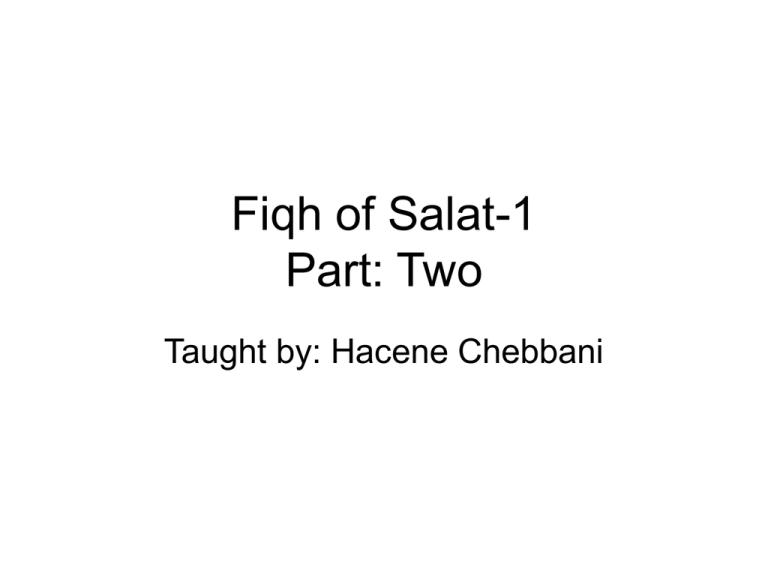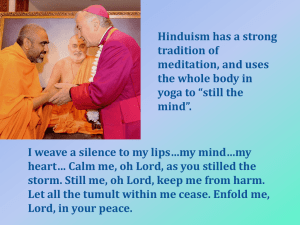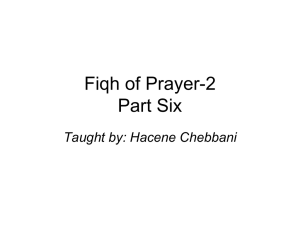Fiqh of Salat
advertisement

Fiqh of Salat-1 Part: Two Taught by: Hacene Chebbani The Times of the Prayer • Praying at fixed Hours: • Allah (SWT) says: “Verily, prayer is enjoined on the believers at fixed hours” 4/103 • This means that each prayer is to be performed at a fixed time and it is not permissible for anyone to perform it before or after its stated time under normal circumstances. Times of the Prayer • Times of the Five Daily Prayers: 1. Dhuhr: The time for it is from when the sun reaches its meridian until the shadow of an object is the same length as the object itself in addition to the initial shadow. Hadith of Jabir: “Stand up and pray.” And so he prayed when the sun was at its meridian…Then he came to him again on the next day for dhuhr prayer and said: “Stand up and pray.” So he prayed when the length of an object’s shadow was almost the same length as the object itself…” Times of the Prayer Calculation of Dhuhr Time in Modern Times: • Calculate the time between sunrise and sunset and then divide it by 2, the result is Dhuhr time. • Dhuhr time for May 18, 2009: Sunrise at: 5:42 am/Sunset at: 9:24 pm, total of hours: 15 Hours and 42mn. Half is: 7 hrs 51mn • 5 hrs 42mn + 7 hrs 51mn= 12 h 93mn =13:33 2.Asr: Asr time begins when the time for Dhuhr ends. There two times for the end of Asr: Times of Asr. 1. The Preferred Time: This lasts from the beginning of the time of Asr until the sun begins to turn yellow. The Prophet (pbuh) said: “The time of Asr lasts until the sun turns yellow…” (Muslim) 2. The Time of Necessity: It is from the time the sun turns yellow until sunset. Hadith: “Whoever prays one raka’at of Asr before the sun sets, he has caught up his Asr prayer” (Bukhari/Muslim) What is the Time of Necessity? • Necessity here refers to when a person is distracted from praying Asr on time or it is difficult for him to pray before the sun turns yellow. – He is flying and hopes to reach his destination before sunset. – Food is served and ready. – He is sick or does not find water, and he strongly feels that water will be available before sunset, or due to other valid excuses. Time of Maghrib/Ishaa’ • The time for Maghrib prayer begins with the disappearance of the sun and it lasts until the redness (twilight) disappears in the sky. • Hadith: “The time of Maghrib prayer lasts until the redness of the sky has disappeared” (Muslim) Times of Ishaa’/Fajr Prayers • The time of Ishaa’ prayer is from the disappearance of the redness in the sky until the middle of the night. • Hadith: “The time of Ishaa’ prayer is until the middle of the night.” (Muslim) • The time of Fajr prayer is from the dawn until sunrise. • Hadith: “The time for the morning prayer is from dawn and continues until sunrise.” (Muslim). Important Notes. 1. It is preferred to pray Dhuhr at the beginning of its time, unless it is too hot. 2. It is preferred to pray Asr prayer promptly, as “the Messenger of Allah (pbuh) used to pray Asr prayer while the sun was still high…” (Bukhari/Muslim). 3. It is a serious sin to miss Asr prayer without any excuse, for Allah’s Messenger (pbuh) said: “The one who misses Asr prayer, it is as if he has been deprived of his family and his property” (Bukhari/Muslim) Important Notes 4. The one who delays Asr prayer until the sun has turned yellow without any excuse has committed a sin, as Allah’s Messenger (pbuh) said: “That is the prayer of the hypocrite: He waits until the sun has turned yellow and is between the two horns of shaytan, then he stands and prays four hasty rakaa’hs in which he remembers Allah but little” (Muslim/others). Important Notes 5. It is preferred to hasten Maghrib prayer and it is disliked to delay it, as Allah’s Messenger (pbuh) said: “My people will continue to be fine, or upon the fitrah so long as they pray the sunset prayer before the stars appear” (Abu dawood/others) 6. It is disliked to sleep before Ishaa’ and to speak after it without necessity, as Allah’s Messenger used to hate sleep before Ishaa’ and speech after it. (Bukhari/Muslim) Important Notes 7. It is preferred to offer Fajr prayer in its early time, as Aisha ® said: “The believing women used to pray the morning prayer with the Messenger of Allah (pbuh) and then return wrapped in their mantles. No one could recognize them due to the darkness.” (Bukhari/Muslim) Important Notes • Every prayer is caught, if one was able to perform one complete rakaa’ (Ruku’ and Sujood are completed). • Hadith: “Whoever caught one rak’ah of Fajr prayer before sunrise has caught the morning prayer, and whoever caught one ra’kah of the Asr prayer before sunset has caught the Asr prayer.” (Bukhari/Muslim) • Second Hadith: “Whoever caught one rak’ah of the prayer has caught that prayer” (Bukhari/Muslim) Times when it is Forbidden to Pray • Uqbah bin Aamir ® said: “There are three times at which the Messenger of Allah (pbuh) forbade us from prayer or burying our dead: 1- While the sun is rising, until it has completely risen (12 to 15mn) 2- When the sun is exactly at its meridian, until it has passed that point. (Around 15mn before Zawaal). 3- While the sun is setting, until it has completely set” (Muslim/others) Two other times. • The hadith of Abee said al-khudri ®: “There should be no prayer after Asr prayer until sunset, and there should be no prayer after Fajr prayer until the sun rises” (Bukhari/Muslim) • What is the reason of prohibition? • Regarding the two ends of the day: “for it rises/sets between the horns of shaytan, and that is when the disbelievers prostrate to it…” • Regarding the middle of the day: “At that time stop praying, for this is the time when the Hellfire is fed with fuel…” From the hadith of Amr bin Abasah in sahih Muslim. Exceptions at Certain Times and Places • The prayer which is forbidden at the previously mentioned times is voluntary prayer, which is prayed without any valid reason. However, it is permissible to pray the following prayers: 1. When making up a missed prayer, whether obligatory or voluntary. The Hadith: “Whoever forgot a prayer should pray it when he remembers it…” (B/M) Second Hadith: “The prophet (pbuh) made up a sunnah prayer after Asr prayer.” Exceptions of the Rule. 2. After making ablution, at any time. Hadith: the story of Bilal with the sunnah of ablution. “… during the day or night…” (B) 3. Whenever we enter the Masjid. (The greeting of the Masjid) as we were commanded by the Prophet (pbuh) to pray two rak’aahs before sitting. Exceptions of the Rule 4. If we are in the sacred Masjid of Makkah, we are allowed to pray at any time. “O children of Abdi Manaaf! Do not prevent anyone from doing tawaaf around this house or from praying therein at any time of the day or night” (Tirmithi/others) 5. Praying salatul-Al-istikhaarah for an emergency or an urgent matter. Exceptions of the Rule 6. Praying at zawaal time on Friday. The Hadith: “…then prays as much as Allah has written for him and then remains silent while the Imam is delivering the khutbah, his sins between the present and the last Friday will be forgiven.” (B) Another Time of Forbiddance • It is prohibited to perform voluntary prayer once the Iqaamah has been called. • The prophet (pbuh) said: “Once the iqaamah has been called, there is no prayer except the obligatory one.” (M/others) • Quit your voluntary prayer with proper salaam,if you are in the first rak’aah, but finish your prayer quickly if you are in the second rak’aah and then join the congregation. Places in which we are Forbidden to Pray • The earth was made pure and a Masjid for the Ummah of Mohamed (pbuh). Excluded from this ruling, few places mentioned in the sunnah. They are: 1. Cemeteries and places with graves. Five days before he passed away, he (pbuh) said: “…so do not take the graves as places of worship. I forbid you to do this.” (M) 2. The toilet: “All of the earth is a Masjid except the cemetery and the toilet” (Tirmithi/Abu Dawood/others) Continued 3. Sitting Place of the camels. (Stables) Hadith: “Do not pray where the camels sit,…” (Abu Dawood) 4. Slaughtering houses, waste management places, busy streets, and on the top of the Ka’bah. Some scholars have mentioned these places based on a hadith in sunan ibn Majah.










